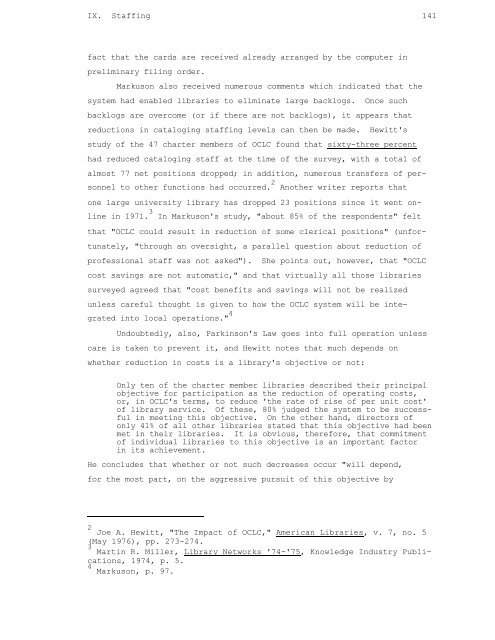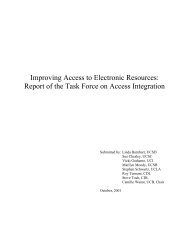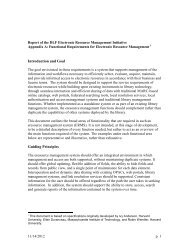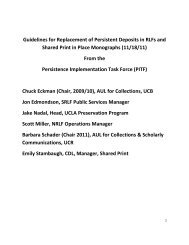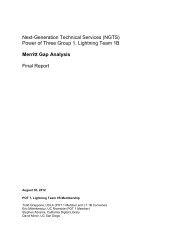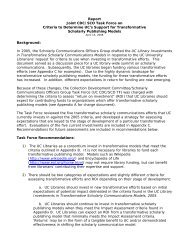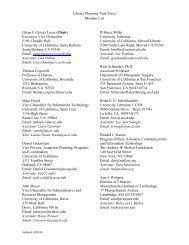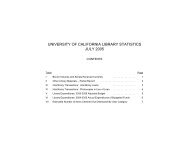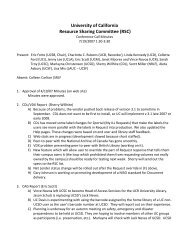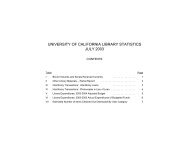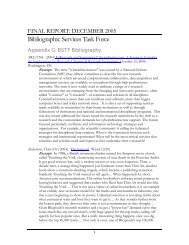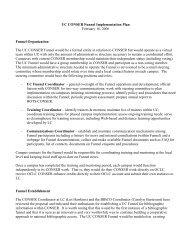The University of California Libraries: A Plan for Development (1977)
The University of California Libraries: A Plan for Development (1977)
The University of California Libraries: A Plan for Development (1977)
You also want an ePaper? Increase the reach of your titles
YUMPU automatically turns print PDFs into web optimized ePapers that Google loves.
IX. Staffing 141<br />
fact that the cards are received already arranged by the computer in<br />
preliminary filing order.<br />
Markuson also received numerous comments which indicated that the<br />
system had enabled libraries to eliminate large backlogs. Once such<br />
backlogs are overcome (or if there are not backlogs), it appears that<br />
reductions in cataloging staffing levels can then be made. Hewitt's<br />
study <strong>of</strong> the 47 charter members <strong>of</strong> OCLC found that sixty-three percent<br />
had reduced cataloging staff at the time <strong>of</strong> the survey, with a total <strong>of</strong><br />
almost 77 net positions dropped; in addition, numerous transfers <strong>of</strong> personnel<br />
to other functions had occurred. 2 Another writer reports that<br />
one large university library has dropped 23 positions since it went online<br />
in 1971. 3 In Markuson's study, "about 85% <strong>of</strong> the respondents" felt<br />
that "OCLC could result in reduction <strong>of</strong> some clerical positions" (un<strong>for</strong>tunately,<br />
"through an oversight, a parallel question about reduction <strong>of</strong><br />
pr<strong>of</strong>essional staff was not asked"). She points out, however, that "OCLC<br />
cost savings are not automatic," and that virtually all those libraries<br />
surveyed agreed that "cost benefits and savings will not be realized<br />
unless careful thought is given to how the OCLC system will be integrated<br />
into local operations." 4<br />
Undoubtedly, also, Parkinson's Law goes into full operation unless<br />
care is taken to prevent it, and Hewitt notes that much depends on<br />
whether reduction in costs is a library's objective or not:<br />
Only ten <strong>of</strong> the charter member libraries described their principal<br />
objective <strong>for</strong> participation as the reduction <strong>of</strong> operating costs,<br />
or, in OCLC's terms, to reduce 'the rate <strong>of</strong> rise <strong>of</strong> per unit cost'<br />
<strong>of</strong> library service. Of these, 80% judged the system to be successful<br />
in meeting this objective. On the other hand, directors <strong>of</strong><br />
only 41% <strong>of</strong> all other libraries stated that this objective had been<br />
met in their libraries. It is obvious, there<strong>for</strong>e, that commitment<br />
<strong>of</strong> individual libraries to this objective is an important factor<br />
in its achievement.<br />
He concludes that whether or not such decreases occur "will depend,<br />
<strong>for</strong> the most part, on the aggressive pursuit <strong>of</strong> this objective by<br />
2<br />
Joe A. Hewitt, "<strong>The</strong> Impact <strong>of</strong> OCLC," American <strong>Libraries</strong>, v. 7, no. 5<br />
(May 1976), pp. 273-274.<br />
3<br />
Martin R. Miller, Library Networks '74-'75, Knowledge Industry Publications,<br />
1974, p. 5.<br />
4<br />
Markuson, p. 97.


